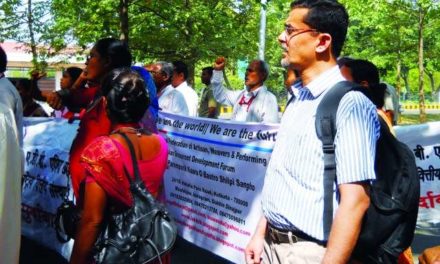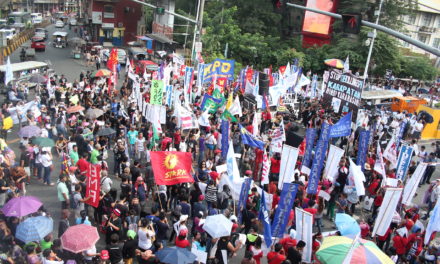On Quarantining the Speaker and other Members of the Las Vegas Expedition and other Measures to Deal with Swine Flu
by Representative Walden Bello
Privileged Speech, May 5, 2009 Philippine House of Representative
I rise on a matter of personal and collective privilege. I would like to devote a few minutes of my time discussing the necessity to intensify mitigation and prevention responses to the spread of influenza A (H1N1), more commonly referred to as Swine Flu.
I would like to commend Speaker Nograles for agreeing to be quarantined upon arrival and I hope all other members of the House that journeyed to Las Vegas would do the same. It would be a blow to government if members of this body were to start coming down with the disease on account of the Las Vegas expedition. It would be terrible if the House were to become the epicenter from which the disease would conquer the rest of the Philippines. That is something from which the reputation of this august body will never recover.
This is a matter we must take with utmost seriousness since one infection has already been identified in the state of Nevada.
In this connection I would like to commend the Committee on Health headed by Congressman Pinggoy for holding hearings on the virus this afternoon, and I would like to share some revelations that emerged there. According to Dr. Eric Tayag, head of the National Epidemiology Center at the Department of Health, if the virus spread in the Philippines, a realistic estimate is that infections could reach 1.7million and deaths would come to 170,000. Let me repeat, infections could reach 1.7million and deaths would come to 170,000.
If the virus were to spread in the Philippines it could potentially affect 1.7m Filipinos, of that 170,000 would die.
The World Health Organization is now on pandemic alert phase 5. Out of 6 phases, this means that a pandemic is imminent and that time to communicate, coordinate, and implement planned mitigation measure is short. According to WHO’s most recent updates, the Swine Flu virus has already claimed 17 human lives. Official WHO count of influenza A H1N1 cases currently stands at 1085 infections, across 21 countries. And in Asia, we have 2 confirmed cases, one in Hong Kong and another in South Korea that have triggered public health emergencies.
Mexico, Swine Flu’s ground zero, declared a five-day nationwide shutdown of all non-essential government and private business in light of the pandemic. China, aside from implementing travel bans to Mexico, is tracking down over 100 people that rode the same airline and may have come into contact with the Mexican citizen who is now receiving treatment in Hong Kong.
A human vaccine against this strain of influenza has yet to be developed. Meanwhile, in this day of efficient air travel, and porous borders, and with the virus easily transmitted in large crowds of people and minimal human interaction, populations across the globe become more susceptible to swine flu. With a three- to seven- day incubation period before the infection manifests itself, our airport surveillances and thermal screenings are not up to the challenge of immediate detection and can even provide a false sense of security and safety among the people. In other words, even if Speaker Nograles and the other members of the Las Vegas expedition pass airport checks, they may still be infected and may still infect us. For their sake and our sake and the people’s sake, they would need to be closely followed up daily for about ten days. But for this to happen, the congressmen should be identified and they should voluntarily submit themselves to clinical monitoring.
The Department of Health is still moving to come up to speed to meet this big challenge to our health and national security. We welcome their move to stockpile swine vaccines against the flu, but we are alarmed that we have only 450,000 capsules of the drug osetamevir at present out of the 1 million that the Department of Health thinks we need.
We also support initiatives in the Senate to assess the preparedness of government agencies in responding to and combating the spread of a pandemic. We also support moves to establish information and assistance centers in Philippine Embassies abroad that would cater to overseas Filipino workers.
Given the gravity of the pandemic, the executive must take it seriously, and if it does not, then congress must step in to push it in this direction. Allow me to share some measures that we in Akbayan feel must be taken to combat the pandemic:
• Effective monitoring of human movement across borders, at all the country’s points of entry. The government must create a master list of all airline and sea vessels passengers entering the country, this should include the following details: country of origin, stop over points, contact information, particularly local addresses and phone numbers they could be reached through, and length of stay in the Philippines. We should then follow up on the health conditions of everyone in the list, particularly those from Europe, Northern and Southern America, within 3 -7 days of arrival in the Philippines.
• Establishment of efficient and effective means of communication and monitoring within and across regions, covering livestock farms, baranggay health centers, provincial and regional hospitals, and other agencies. These measures should ensure the participation of community-based and other civil society organizations and the media. All communication lines must be open to the public. The administration must not have the power to monopolize information gathering and censor its dissemination to the public.
• Stockpiling of anti-viral drugs, and preparing their efficient and effective distribution among community health centers. We must ensure that drugs bought are effective in the treatment of this strain of influenza; barring drugs CDC has declared the virus resistant to, namely amantadine and rimantadine. We should also ensure that the drugs bought are of top condition. We must make steps to properly dispose of all drugs that have expired and ensure that they do not fall in the wrong hands and be used or sold for treatment.
• Equipping public hospitals and community health centers with quarantine and treatment facilities. Sanitation of all health centers and their surroundings must be ensured. The additional equipment and facilities, such as masks and gloves, that are essential to the prevention of the spread of the disease through human contact must be provided.
• Monitoring and sanitizing of all livestock farms, particularly hog barns, Proper waste disposal should be observed. Distribution of hog vaccines at minimum prices, if not free of cost, must also be undertaken.
• All monitoring and information dissemination measures must be performed in coordination with regional and international bodies. As this pandemic knows no borders, global coordination is integral to the success of this mission.
All these measures will cost money. Along with Senator Francisco Escudero, we propose that Malacanang use its P 9.8 billion pork barrel to fund this emergency effort instead of devoting this vast sum to spreading another disease, that of corruption.
Let me end by sharing Dr. Tayag’s recommendation of a contingency plan for congress. He said that we need to identify a building to move to in the event that we have to vacate the Batasan. Further, he said that we should identify what committees are absolutely necessary and what committees and other bodies we should suspend during the pandemic. We should determine how many people to keep actively working and how many we should ask to stay at home.
Influenza A H1N1 is a threat to public health and national security. We in congress must treat it as such.
Thank you very much.









